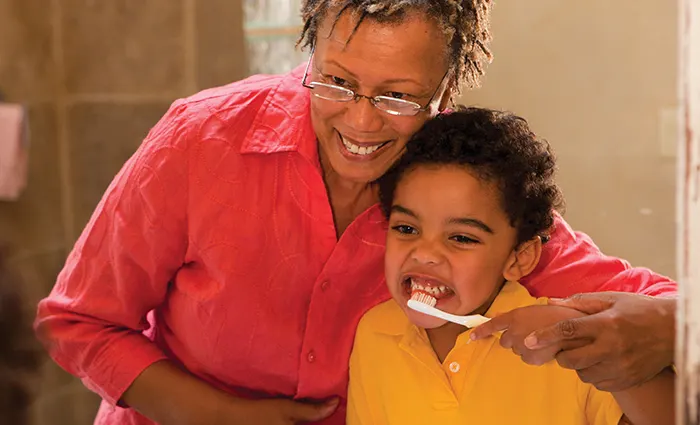
In addition to taking care of your child's teeth at home, it’s important that you talk to other adults who care for your child. This way, you can make sure that the healthy habits you’re establishing at home are able to continue, even when you’re not around.
Why Is This Important?
Making sure that your child gets their teeth brushed twice a day is key – whether they’re in your care or not. Regular brushing reduces the risk of tooth decay in baby teeth, as well as the risk of having to have them removed because of decay. Healthy baby teeth straighten the jaw, hold the space for adult teeth to eventually come in, help with chewing, smiling, and talking, and increase the likelihood that their adult teeth will come in healthy.
In addition to brushing, talking to your child’s carer about the foods and drinks they give to your child is important. They should continue giving your child a balanced diet that’s low in sugar and high in the nutrients that aid oral health, including calcium, phosphorous and Vitamin C. Not only will a balanced diet cut down on the potential for decay, but also it won’t undo the work in establishing healthy habits at home.
How Can You Help Your Child’s Carers?
The best way to start is with a three-step approach called “Talk. Share. Plan.”
Talk
Talk to your child’s carer about why you want your child to follow healthy brushing and eating habits, and create a plan.
Share
Share materials and information from your dental checkup and useful information you can find on the Internet. This could take some pressure off you and may even make them take what you’re saying more seriously.
Plan
Plan ahead by giving your child's carer an extra toothpaste and toothbrush for your child's use, bringing some safe snacks if you can, and reminding them with texts or phone calls when it’s time to brush.
After that initial conversation, one of the easiest things you can do is to buy an extra toothbrush and toothpaste and leave it with the carer. This will save you from having to remember to pack it before a visit, and ensures that the other carer will always have the tools they need to care for your child’s oral health.
Talk to them about how to brush your child’s teeth, how much toothpaste they need, and the frequency they should be brushing. Discuss the foods and drinks that are best for your child’s oral health and develop a plan to limit the amount and frequency of sugary foods and drinks. Some carers may struggle with this, especially if they want to treat your child to something sugary. These can be really challenging conversations, but you want the best for your child. Tooth decay is not an outcome anybody wants.
If you child is old enough, give them the responsibility of being the “toothbrushing hero” and reminding their carer to help brush their teeth. While these conversations may not be easy at first, over time they’ll get easier and your child’s carer will become a helpful part in keeping your child’s teeth healthy.
Related Articles
Sign Up
for expert advice and exclusive offers




